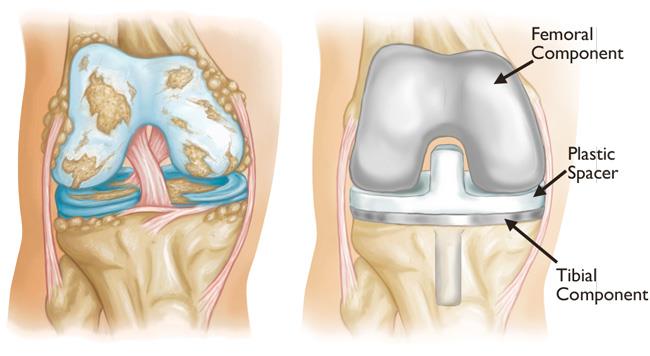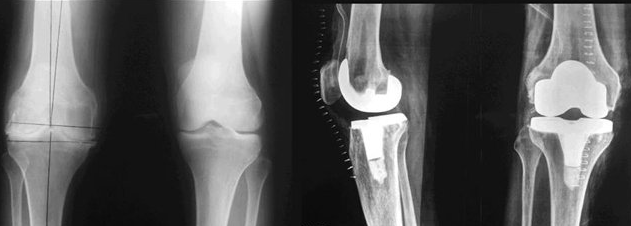KNEE
Total Knee Replacement
The decision to proceed with Total Knee Replacement surgery should be treated as a last resort and done in close consultation with your surgeon and family. In a healthy knee, the joint is lined with cartilage which acts like a cushion and smooth surface allowing easy, frictionless movement. Degeneration of cartilage in the knee means there is no layer to act as a shock absorber or reduce friction, causing pain and difficulty moving. There are methods of knee replacement surgery such as conventional instrumentation and advanced technologies including computer navigation or robot assisted to improve various measures of accuracy.
Procedure
During surgery, the damaged portions of the femur and tibia are removed and replaced with new components to allow the knee to move smoothly, without friction. The components are made from metal and are cemented or ‘press fit’ depending on age and quality of bone. A plastic insert is placed between the two metal components which acts to absorb weight and is designed to bear significant wear.
Once anaesthetised, a vertical incision is made over the knee. The knee capsule and surrounding structures are cleared giving direct access and exposure to the joint. If instrumented, cutting jigs and guides are used to make cuts on the femur and tibia to remove damaged bone. Computer navigation or robotic assisted surgery are also options used by surgeons to help improve accuracy of cuts and implant placement. The patella may be replaced depending on a number of factors and Dr du Sart’s clinical reasoning.
Dr du Sart chooses to use robotic assisted knee replacement as it offers the potential to refine and allow for greater precision. He has performed many conventional instrumented knee replacements and sees robotic assisted surgery as a significant leap forward in technology and innovation. It allows for greater planning, customisation and precision, whilst this technology is new, it is paired with proven implants, which should translate to satisfied patients long term.
Find out more about
Robotic Assisted Surgery.


After Your Operation
Pain Management
Recovery from knee replacement surgery is usually painful, however with improvements in technology and current techniques, patient comfort is greatly improved. Usually patients will initially require regular pain relief consisting of paracetamol and anti-inflammatories if indicated. Faster acting pain medication will be given for periods of increased pain during the day (breakthrough pain). Like any medication there can be side effects such as nausea, stomach upset or sedation. However doses can be reviewed to ensure your comfort and reduction of these side effects. It is also recommended to ice and elevate the knee every two hours to help with swelling and pain.
Mobility
Whilst in hospital a physiotherapist will visit you regularly to give you exercises and assist your return to walking. Your goals in the first 2 weeks after surgery are to:
- Increase comfort with your new knee
- Allow swelling to settle - regularly ice and elevate your knee
- Work on and improve knee range of movement - be careful not to let the knee become stiff
- Regain function of leg muscles - particularly quadriceps
- Begin weight bearing with your new knee.
It is important that you perform the prescribed exercises to ensure optimal recovery.
Hospital stays range from 3-7 days, however for those patients who require longer, a transfer to the rehabilitation centre for more care may be organised.
Return to Work and Sport
Your return to work will vary depending on the procedure and type of work you do. A minimum of 2 weeks off work should be taken to allow for your incision to heal and mobility to improve. For labour intensive work you may require up to 6 weeks before returning to full duties.
During this period patients are not fit to perform duties that include:
- Prolonged standing
- Heavy lifting
- Bending or,
- Excessive stair climbing
Low impact activities such as cycling and swimming/hydrotherapy can be commenced from week 4 and is also recommended to help increase muscle strength and function. High impact activities such as running and jumping are best avoided for 8-12 weeks post operation.
Driving
The Australian Orthopaedic Association (AOA) recommends at least 6 weeks after surgery before you consider recommencing driving. Dr du Sart will be happy to advise you when it is safe to return to driving at his consultation.

© All rights reserved
For all appointments and enquiries please contact us on:
Phone: 08 9779 9767
Email: admin@ryandusart.com.au
Address: 6 Higgins St, South Bunbury, 6230
